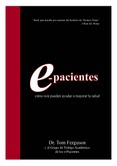It’s been a long time coming, but it’s here! From the English “e-Patients: How they can help us heal health care,” you can now click to download the Spanish e-Pacientes: cómo nos pueden ayudar a mejorar la salud.
To read this post in Spanish, click here.
From the editors of the Spanish edition, Elia Gabarrón and Luis Fernández Luque:
 For some time we’ve had in mind the possibility of carrying out the translation of the e-Patient White Paper into Spanish, because with more than 420 million of Spanish speakers worldwide, our language is now the second most spoken language in the world, and the third most widely used in Internet. In fact, there are almost as many Spanish speakers in the US as in Spain.
For some time we’ve had in mind the possibility of carrying out the translation of the e-Patient White Paper into Spanish, because with more than 420 million of Spanish speakers worldwide, our language is now the second most spoken language in the world, and the third most widely used in Internet. In fact, there are almost as many Spanish speakers in the US as in Spain.
After Dave deBronkart’s presentation at a conference held in Bilbao (Spain) last July, Patients and professionals in Web 2.0, this idea gained momentum. A group of seven Spanish people with different professions and from different areas of the country, but with the common interest of encouraging and showing as many people as possible the e-patient revolution, organized ourselves through Twitter. After a few months’ teamwork, the Spanish version of the e-Patient White Paper is now a reality.
The e-patient movement that emerged in the U.S. has clearly become a phenomenon thanks to the growth of Web 2.0. One of the most universal interests on the Internet is health, and therefore, anyone with Internet access is potentially an e-patient regardless of their nationality. To find health information on the Internet does not make us e-patients. It is a symptom of a more radical shift towards more skilled citizens, empowered and committed with their health. If we seek information to decide when we’re buying a home, why not with our health? e-Patients are called to make decisions about their health in close collaboration with health professionals. The internet is just another tool, a gateway to find information and socialize. Real e-Patients don’t believe everything they find online, they develop a set of skills to find quality information; they learn how to separate the sheep from the goats.
Within this context, the Hispanic community about health 2.0 is in full swing. It is impossible to list everyone involved in the issue, from the trenches of primary care to R&D researchers. Web 2.0 is already being used for the benefit of both patients and Spanish-speaking professionals. For example, there are Spanish patient blogs with over 600,000 followers (eg, Diario de Pedro), there are communities with thousands of members (eg EsTuDiabetes), and there are also communities where patients and professionals work together like forumclinic. Spanish hospitals are also beginning to get up to date with the use of social media (observatics). All of them, working-dreaming about improving our health and health systems using Web 2.0.
Along with the many initiatives, there is also an intense debate about the impact of Web 2.0 in healthcare, debates such as the weekly twitter chat #hcsmeuES from Spain and #hcsmla from Latin America. Conferences and un-conferences are organized with increasing frequency. The community has also created a directory of resources for Spanish Health 2.0, wikisanidad. In addition, we must highlight the book about e-Patients and Social Networks that has been downloaded thousands of times in a few days (available at www.salud20.es). Another very good example of collaboration towards participatory medicine and Web 2.0 is the Manifest of Abla, www.salud20.es/manifiesto, written collaboratively by more than 70 authors using tools such as Google Docs and Twitter.
But it doesn’t end here. There are many projects and ideas flowing from the Hispanic community about Health 2.0. We belong to a global community of people who believe that Web 2.0 can improve our health systems. We must join hands with our fellow travelers from the U.S. and from around the world, because the way to work things out is by talking.
Elia Gabarrón (@EliaGabarron) & Luis Fernández Luque (@luisluque)
Editors of the e-Patient White Paper Spanish version






All, the above comment links to this page in Japanese, which says “We hope this movement will come to Japan”!
And to that we say, yes, please join our Society – you can be the first to bring it to Japan. http://www.participatorymedicine.org/join-us